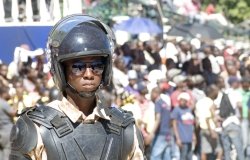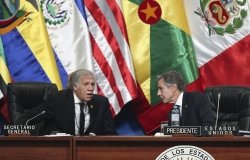Democratic Deficits: Addressing Challenges to Sustainability and Consolidation
How are the various democracies around the world addressing the deficits they face today? What cases are viewed as particularly successful in addressing poverty or social services? Have institutional reforms—-anti-corruption measures, participatory governance, perhaps decentralization—-been successful or even useful? How do we weigh the impact or likely success in countries facing ethnic or religious division? This policy conference, sponsored by RTI International and the Woodrow Wilson International Center for Scholars, addressed these issues with the help of a group of world-class scholars, journalists, and practitioners with extraordinary insights into the topic and the country cases they have examined.
Overview
On September 18, 2007, the Research Triangle Institute (RTI) and the Latin American Program cosponsored a policy forum, "Democratic Deficits: Addressing Challenges to Sustainability and Consolidation Around the World." The forum explored comparatively the obstacles countries face in sustaining and consolidating democratic systems. In keynote address, Philippe C. Schmitter of the European University Institute in Florence, Italy, criticized an ever-expanding set of criteria" for evaluating the quality of democracy, arguing instead for a relative assessment that compared cases across the same cultural or geopolitical areas. The use of diminutives such as "low-intensity," "illiberal," "delegative," and "defective" in describing new democracies obscures the fact that the "neo-democracies" that have emerged since 1974 have actually made great progress, particularly in Latin America. Schmitter argued that the quality of a particular democracy should be measured relative to its potential, not according to the standards of more established democracies that took centuries to develop.
A panel on "Social Deficits, Poverty, and Inequality" considered the governance challenges faced by new democracies as they seek to improve the quality of life for broad segments of the population. Evelyne Huber of the University of North Carolina outlined the partial successes achieved by some Latin American and African democracies in addressing poverty and inequality and improving social services.
To explore how weak or ineffective national and local institutions continue to plague democratically elected governments, Luis A. Chirinos of Participa Perú and RTI International discussed the challenges of accountability and civil society in Peru. Other panelists examined questions of weak or ineffective public sector institutions, both national and local, and the challenge of curbing corruption.
A final panel on "Limitations and Threats to Democracy" explored the development of democratic governance in the most difficult environments, including post-conflict settings. Former Wilson Center fellow Brooke Larson, Stonybrook University, and 2008 Wilson Center public policy scholar Rami G. Khouri,
American University, Beirut, were among those discussing the challenges facing the democratic process in addressing deep societal cleavages, both ethnic and religious, in Bolivia, Lebanon, the Balkans, and Afghanistan.
Documents & Downloads
- Democratic Deficits: Addressing Challenges to Sustainability and ConsolidationDownload
- Democratic Deficits: Addressing Challenges to Sustainability and ConsolidationDownload
- Democratic Deficits: Addressing Challenges to Sustainability and ConsolidationDownload
- Democratic Deficits: Addressing Challenges to Sustainability and ConsolidationDownload
- Democratic Deficits: Addressing Challenges to Sustainability and ConsolidationDownload
- Democratic Deficits: Addressing Challenges to Sustainability and ConsolidationDownload
- Democratic Deficits: Addressing Challenges to Sustainability and ConsolidationDownload
- Democratic Deficits: Addressing Challenges to Sustainability and ConsolidationDownload
- Democratic Deficits: Addressing Challenges to Sustainability and ConsolidationDownload
- Democratic Deficits: Addressing Challenges to Sustainability and ConsolidationDownload
- Democratic Deficits: Addressing Challenges to Sustainability and ConsolidationDownload
- Democratic Deficits: Addressing Challenges to Sustainability and ConsolidationDownload
- Democratic Deficits: Addressing Challenges to Sustainability and ConsolidationDownload
- Democratic Deficits: Addressing Challenges to Sustainability and ConsolidationDownload
Hosted By

Latin America Program
The Wilson Center’s prestigious Latin America Program provides non-partisan expertise to a broad community of decision makers in the United States and Latin America on critical policy issues facing the Hemisphere. The Program provides insightful and actionable research for policymakers, private sector leaders, journalists, and public intellectuals in the United States and Latin America. To bridge the gap between scholarship and policy action, it fosters new inquiry, sponsors high-level public and private meetings among multiple stakeholders, and explores policy options to improve outcomes for citizens throughout the Americas. Drawing on the Wilson Center’s strength as the nation’s key non-partisan policy forum, the Program serves as a trusted source of analysis and a vital point of contact between the worlds of scholarship and action. Read more
Thank you for your interest in this event. Please send any feedback or questions to our Events staff.










